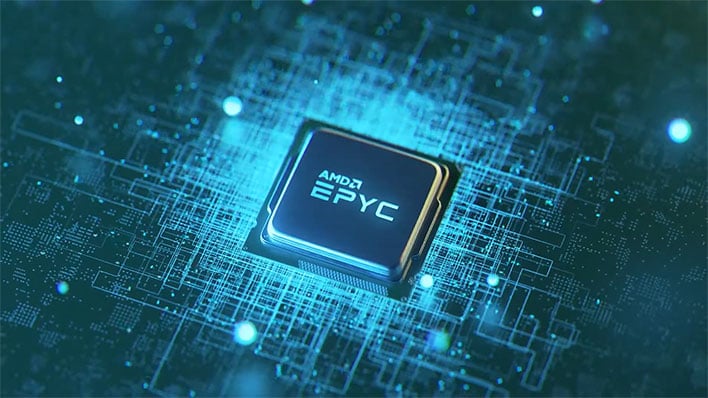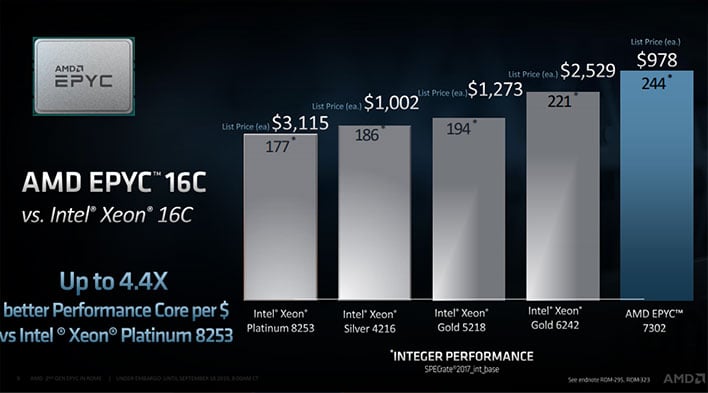AMD continues to add more server feathers to its cap courtesy of its Zen 2 CPU architecture, which is the driving force behind its 2nd generation
EPYC "Rome" processors. One of those feathers is
Dell—it announced five new PowerEdge platforms powered by EPYC, each one designed from the group-up and optimized to support features like PCI Express 4.0.
Among the new offerings are two 1S racks (PowerEdge R6515 and R7515) and three 2S racks (R6525, R7525, and C6525). According to Dell, the EPYC-equipped PowerEdge C6525 delivers weather modeling results in half the time as previous generation EPYC servers, resulting in faster severe storm notifications.
Dell also claims its newest server products enabled improved vSAN Ready Node deployments with up to a 51 percent increase in input/output per second (IOPS) over previous generation EPYC-based PowerEdge systems.
"The unparalleled performance leadership of the 2nd gen AMD EPYC processor family opens up a world of possibilities for Dell Technologies customers by addressing critical workloads in the cloud, high-performance computing and the enterprise," said Forrest Norrod, senior vice president and general manager of the Datacenter and Embedded Solutions Business Group, AMD.
"AMD and Dell Technologies have a long-standing history of providing customers with high performance data solutions. The breakthrough design of the new Dell EMC PowerEdge systems continues that collaboration and takes full advantage of the AMD Infinity Architecture and leading security features of AMD EPYC to deliver exceptional performance and TCO to our customers," Norrod added.
AMD continues to pile on the design wins with its
Zen 2 product family. Of course, Dell is not new to the EPYC line. However, AMD has to be pleased that Dell is implementing its 2nd gen EPYC chips into a new line of PowerEdge servers. In addition, Google and Twitter both
recently deployed 2nd gen EPYC processors in various datacenters.
The 2nd gen EPYC lineup is available in up to 64 cores (and 128 threads), with clockspeeds of up to 3.4GHz (Precision Boost). EPYC also offers 128 or higher PCIe 4.0 lanes. According to AMD, the latest EPYC processors offer twice the performance of Intel's Xeon 8200 series.
AMD also announced a new addition to the 2nd gen EPYC family. The new EPYC 7H12 is another 64-core/128-thread beast, but with a higher TDP than the other models, at 280W. This allows the chip to run faster, with a 2.6GHz base clock and 3.3GHz boost clock. So at the top of the stack, AMD now has the following...
- EPYC 7H12: 64 cores / 128 threads, 2.60GHz to 3.30GHz, 256MB cache, 280W TDP
- EPYC 7742: 64 cores / 128 threads, 2.25GHz to 3.40GHz, 256MB cache, 250W TDP
- EPYC 7702: 64 cores / 128 threads, 2.00GHz to 3.35GHz, 256MB cache, 250W TDP
Due to the increased power draw, AMD is pitching the EPYC 7H12 at server implementations with liquid cooling. For customers are equipped to run the new part, it delivers better performance—AMD's own benchmarking pegs it as achieving a LINPACK score of around 4.2 teraflops, which is around 11 percent better than the next 64-core chip in line, the EPYC 7742.
AMD's core pitch (see what we did there?) is the value proposition its EPYC processors provided, compared to Intel's Xeon lineup. In 8-core territory, AMD claims up to 4.7x better performance core per dollar (versus Intel's Xeon Gold 6244), and in 16-core territory, AMD claims up to 4.4x better performance core per dollar (as seen in the slide above).
Lower price points have been a staple of AMD's product stack for quite some time, though with its Zen 2 architecture, AMD is able to deliver a high level of performance too. In addition to Dell jumping on board (or staying on board, really), AMD says to expect 2nd gen EPYC implementation announcements from other big names as well.






